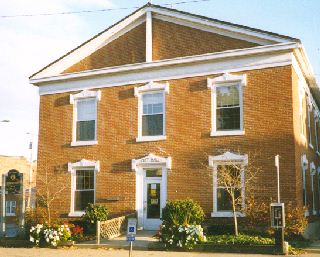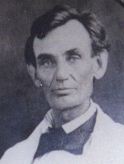Home | News | Books | Speeches | Places | Resources | Education | Timelines | Index | Search
© Abraham Lincoln OnlineBeardstown Courthouse
Third & State streets
Beardstown, IllinoisTake a Lincoln Law Career Photo Tour
Long before the "Beardstown Ladies" appeared in the media, Abraham Lincoln put this river town on the map, so to speak, when he tried a murder case two years before he was elected president.
The Town
You'll find Beardstown about 45 miles northwest of Springfield, in the heart of Illinois farm country. As you approach the intersection of Routes 67 and 100 southeast of the Illinois River, you'll see a sign which proclaims Beardstown as the home of Lincoln's famous "Almanac Trial." Take route 67 to Sixth Street (the last street before the bridge) to State Street, turn east and proceed to Third Street.
Lincoln's known association with the town goes back to March 1832, about 13 years after its settlement by Thomas Beard of New York. At the time Lincoln lived 35 miles away in New Salem, a pioneer village bordered by the Sangamon River. He had helped pilot the Talisman, a small steamboat up the river from Beardstown to the New Salem area and back. The work included clearing the river of obstructions and breaking up ice.
In April 1832 he volunteered for service in the Black Hawk War and marched from New Salem to Beardstown, where he was elected captain of his company. The approximate site is marked in Schmoldt Park. After his military service, he traveled to Beardstown to pick up supplies for his store. When he became a lawyer, he tried cases in the town's courthouse.
The Building
The "Almanac Trial" courthouse, built by Beard in 1844, served Cass County nearly 30 years before nearby Virginia stole the county seat (stealing county seats was a common Midwest activity in the nineteenth century). The original brick building still stands on the town square. Upstairs you will find the courtroom where Lincoln defended 24-year-old William "Duff" Armstrong. This is the only courtroom still in use where Lincoln once practiced law. The building is now called the Old Lincoln Courtroom and Museum, and includes the original jail where Duff Armstrong was held before the trial, as well as collections of historical artifacts from the region.
The Photograph On the wall, pause to examine a copy of a Lincoln ambrotype taken on May 7, 1858, the day he won the case. After the acquittal, 22-year-old Abraham Byers stopped him in the street and asked him to pose in his studio. Lincoln protested that his rumpled white linen suit was not fit for a portrait, but the younger Abraham prevailed.
The Trial
The acquittal represented a personal and professional triumph for Lincoln, who once rocked the defendant's cradle in New Salem. Lincoln took over the defense after a change of venue and the case moved from Mason to Cass County.
The trial resulted from a nighttime brawl, and the resourceful Lincoln produced an 1857 almanac, which was the year the incident occurred, to argue that the state's witness could not have seen Armstrong kill the victim. There was no moonlight at the time and he was a long distance from Armstrong, so theoretically he could not see that far in the dark. Lincoln also produced a witness who helped acquit Armstrong.
On August 12, 1858, a few months after the trial, Lincoln appeared in Beardstown to speak as the Republican candidate for the U.S. Senate. He spoke on a platform in the city park, a site marked by a plaque across from the courthouse. His opponent, Stephen Douglas, spoke the next day, and later that month they officially began their famous series of debates.
The courthouse is open Monday through Saturday from 10:00 a.m. to 4:00 p.m. Call 217/323-3225 for more information.
Related Links
Lincoln-Herndon Law Offices
Lincoln Legal Career Highlights
Lincoln's Advice to Lawyers
Lincoln's Notes for a Law Lecture Related Reading
Billings, Roger and Williams, Frank J., editors. Abraham Lincoln, Esq.: The Legal Career of America's Greatest President. University Press of Kentucky, 2010.
Davenport, Don. In Lincoln's Footsteps: A Historical Guide to the Lincoln Sites in Illinois, Indiana, and Kentucky. Revised edition, Trails Books, 2002.
Dirck, Brian. Lincoln the Lawyer. Urbana: University of Illinois Press, 2007.
Donald, David Herbert. Lincoln's Herndon. DaCapo, 1989.
Duff, John J. A. Lincoln, Prairie Lawyer. New York: Rinehart & Co., 1960.
Fraker, Guy C. Lincoln's Ladder to the Presidency: The Eighth Judicial Circuit. Carbondale: Southern Illinois University Press, 2012.
Frank, John P. Lincoln as a Lawyer. Americana House, 1991.
Hill, Frederick T. Lincoln the Lawyer. Fred B. Rothman & Co., 1986.
Lincoln, Abraham. The Papers of Abraham Lincoln: Legal Documents and Cases. University of Virginia Press, 2008.
Matthews, Elizabeth W. Lincoln as a Lawyer: An Annotated Bibliography. Carbonale: Southern Illinois University Press, 1991.
McDermott, Stacy Pratt. The Jury in Lincoln's America. Ohio University Press, 2012.
Spiegel, Allen D. A. Lincoln, Esquire: A Shrewd, Sophisticated Lawyer in His Time. Mercer University Press, April 2002.
Steiner, Mark E. An Honest Calling: The Law Practice of Abraham Lincoln. DeKalb: Northern Illinois University Press, 2006.
Stowell, Daniel W. In Tender Consideration: Women, Families, and the Law in Abraham Lincoln's Illinois. Urbana: University of Illinois Press, 2002.
Stowell, Daniel W., editor. Papers of Abraham Lincoln: Legal Documents and Cases. University of Virginia Press, 2007.
Townsend, William H. Lincoln the Litigant. Lawbook Exchange, 2000.
Walsh, John Evangelist. Moonlight: Abraham Lincoln and the Almanac Trial. St. Martin's Press, 2000.
Whitney, Henry C. Life on the Circuit with Lincoln. Lawbook Exchange, 2001 reissue.
Woldman, Albert A. Lawyer Lincoln. Boston and New York: Little, Brown, and Co., 1937.
Home | News | Education | Timelines | Places | Resources | Books | Speeches | Index | Search Text and photos copyright © 2019 Abraham Lincoln Online. All rights reserved. Privacy Policy


